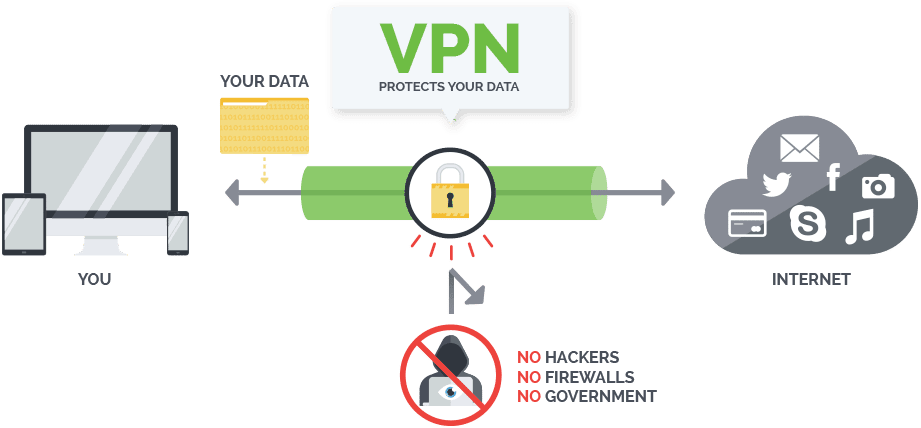How to Block ISP from Tracking You – VPN vs Tor vs Proxy
How to stop your ISP from monitoring your online activities? Regardless of whether you live in USA, UK, Canada, or Australia, your Internet service provider can track what you are doing online. This includes your browsing activities and history, downloads, and apps you use. With news emerging that American ISP can now legally sell your browsing history to third parties, it has become even more important to block your ISP from tracking you. In this guide, we’ll compare VPN, Tor, and proxies and see which of these three anonymizers is best to prevent ISP snooping.
How to Block ISP from Tracking You
ISPs Always Keep Logs of your Online Activities
Internet service providers have always kept records of which sites you visit and what files you download using their Internet traffic. Everything you do online can be traced by your ISP unless you are using VPN or Tor browser.
- Comcast retain IP addresses that use BitTorrent for over 6 months.
- Verizon keep private info related to their users’ IP address for 18 months.
- Qwest/Century retain IP address logs for approximately one year.
- Cox are believed to keep logs for up to six months.
- Charter keep logs for up to one year.
What Kind of Info Does My ISP Track?
According to AT&T’s privacy policy, they keep logs of the following data when you use their services.
- Account Information includes your name, address, telephone number, e-mail address, service-related details such as payment data, security codes, and service history.
- Network Performance & Usage Information tells AT&T how you use their networks, products and services.
- Web Browsing & Wireless Application Information tells your ISP about the websites you visit and the mobile applications you use on their networks.
- Location Information tells your ISP where your wireless device is located, as well as your ZIP-code and street address.
- TV Viewing Information reveals which programs you watch and record and similar information about how you use our video services and applications.
Does My Internet Provider Know What Websites I Visit?
Yes, your ISP can monitor which websites you are visiting, apps you are using, and files you are downloading. In simple terms, each site has an IP address. Any ISP can easily track what IP addresses their users contact. Therefore, there’s nothing that can prevent them from knowing which sites you are visiting as well as when and where you visit them. Basically, unless you encrypt your traffic using VPN, your ISP can trace any data you send/receive over the Internet.
Keep Your ISP from Tracking You – Use VPN
In order to prevent your ISP from tracking your online activities, you need to re-route all your Internet traffic through a secure, private tunnel. Your ISP can actually see that you are connected to that tunnel, but cannot trace what you are doing online while connected to that tunnel. This process is exactly what happens when you use VPN.

How VPN Protects You From ISP Tracking
When you connect to a VPN server, you are basically encrypting all your Internet traffic and masking your IP address. That means that your ISP, websites you visit, or apps you use can no longer track what you are doing online. Thus, as long as you are using VPN, you are practically protecting all your private data. The process of setting up a VPN is fairly easy.
- First, sign up with a reputable VPN service.
- Then, download and install your VPN provider’s software or app on your Windows PC, Mac, iPhone, iPad, or Android.
- Launch the VPN application and sign into using your newly created VPN account.
- From within the app, connect to a VPN server.
- Leave the VPN application running.
- Your ISP can now no longer track what you are doing online.
Which VPN is Best to Stop ISP from Tracking Me?
There are countless VPN services you can use. While most of them are trustworthy, there are some which cannot be trusted. Many free VPN providers can potentially keep logs of your browsing activity, defeating the purpose of using VPN for online anonymity.
Some VPN apps can even infect your devices with malicious malware. Therefore, you have to make sure that the VPN you are using has a good reputation and has a good track record in the field of online privacy.
Other things to look out for in VPN services include:
- No-Logs Policy.
- Up-to-date VPN protcols.
- VPN apps for PC, Mac, iPhone, iPad, and Android.
- Advanced Encryption Standard (AES-265)
- Fast VPN servers on Tier-1 networks.
Based on the features we have listed above, here are the best VPN providers you can use to prevent your ISP from tracking your online activity.

- Best for streaming and privacy
- High speed servers in 160 VPN locations
- Works for Netflix, BBC iPlayer, Amazon Prime Video, and Hulu
- 24/7/ live chat support
- 3 extra months free on annual plan

- UltraHD streaming
- Free Smart DNS proxy
- Unblocks all major streaming services
- Limited Time 72% Discount

- Unlimited VPN connections
- Over 1000 servers
- Ad-blocking feature available
- User-friendly application
- Exclusive Smart VPN feature
- Standalone Smart DNS subscription available
- Extra security features
- Extensions for Firefox and Chrome
- Split-tunneling available
Prevent Your ISP from Spying On You using Tor
You can also use a Tor Browser to encrypt all your traffic and prevent ISP and other from tracking what you are doing online. This method does have its disadvantages when compared to VPN. Without getting too technical, whenever you are using Tor, your traffic passes through several nodes or relays. Each of these nodes decrypts part of the traffic before passing it to the next node. The final relay, called the exit node, decrypts the innermost layer and sends the original data to its destination without revealing or even knowing the source IP address, making it possible to use Tor for anonymous browsing.
The problem is that anyone can set up an exit node and because it’s the place where traffic is decrypted, anyone who runs an exit node can read the traffic passing through it. Not to mention the fact that government agencies like the NSA are extremely suspicious of anybody using Tor, even when there’s no foul play involved.
Your Internet speed might also suffer depending on what route through the Tor network your traffic ends up taking.
Can I Use Proxies to Stop My ISP from Spying On Me?
While proxies to provide some level of online anonymity, they offer no encryption what so ever. You might be able to hide your identity from the sites or apps you visit, but your ISP can still monitor your browsing activities, even when using proxies. Unlike when using VPN, your IP address is still publicly visible as well.
How to Block ISP from Tracking You – VPN vs Proxies vs Tor
Both Tor and proxies are useful tool in certain instances. They provide online anonymity to some extent. However, if you are serious about your online privacy and want to completely prevent your ISP from tracking your browsing activities, a proper VPN service is what you need.









Actually I contracted a VPN service just for the easyness of traveling through the web but without knowing all the advantages this type of service provides with respect to privacy and anonimity in the web I will contibue to protect myself especially from people who wants to know more about me
I appreciate the info you are providing. Until yesterday I had no knowledge of VPN. It is the vote by congress allowing ISP to track and sell info of their customers reported in the news that has brought the option of a VPN to my attention. Regarding your article of guarding one’s privacy a couple of considerations come to mind. As yet, I have never used Tor, although I have considered it and probably will try it in the near future. I think in fairness to Tor and those reading your article, you should let it be known Tor is without cost. Also, your pointing out a concern about the exit node being compromised I think is probably highly unlikely. I don’t know the measures being taken to prohibit such a compromise, but common sense tells me the people responsible for the creation and operation of Tor are not going to allow such a potential risk go unchecked. I do think there are valid criticisms of Tor, but not the one you have stated. Do you know of an instance this has occurred? As well, do you know of an instance in which a well thought of VPN has in some way misused their customers data? One last thought if I may. In reviewing a few VPNs last night I did read the privacy policy for the VPN “HIDE MY ASS”. I can’t say I was altogether comforted by what I read. I won’t state specifics here, but I do suggest you consider advising your readers to take the time to read the privacy policy of a VPN he or she may be considering.
Sincerely,
John Franks
Hi. Regarding Tor exit nodes being potentially harmful, please see this article https://hackertarget.com/tor-exit-node-visualization/
I think the best practice would be using a combination of Tor and VPN together, although this can take its toll on your Internet speed. That way you can protect yourself against Tor exit nodes and also keep your real IP address hidden from your VPN service. Feel free to read this article for more info https://thevpn.guru/tor-vpn-combination-guide/
I also read a study that stated the nsa own a large number of exit nodes. I do not know of the validity of it, but if the article is correct they would just collect all of your data as it exits. True or not i personally don’t want to take a chance. The government forced us to this point of protecting ourselves. I don’t use these things for illegal activity, but it is getting out of control how much we are being watched and monitored. The final straw for me was going to new websites that I had never been to and seeing my amazon recent searches. I feel it’ll only get worse.